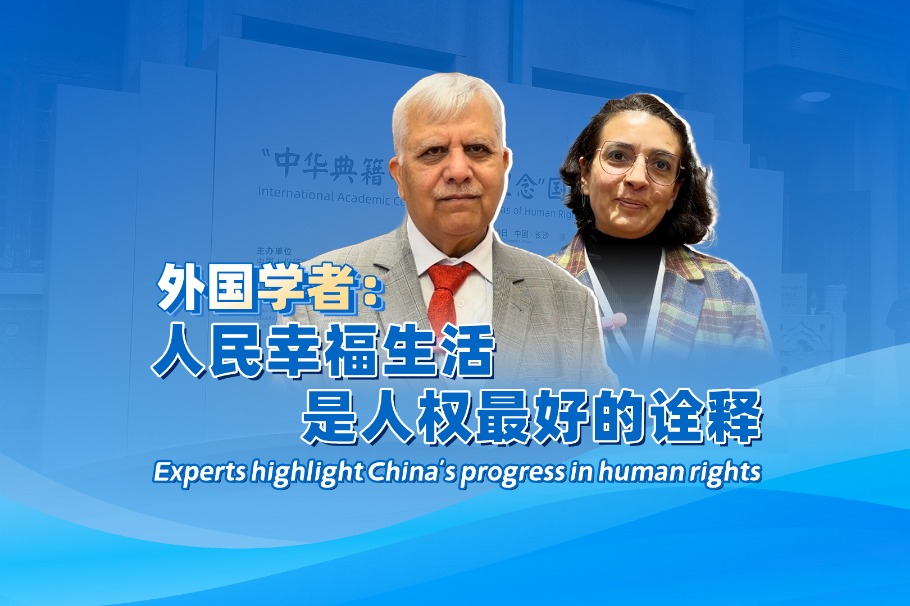Expert: US, Asian allies seek to isolate, encircle China
By YIFAN XU in Washington | China Daily Global | Updated: 2023-08-23 11:06
A US expert says that the Biden administration's hosting of a US-Japan-South Korea summit was intended "to economically and technologically isolate China, and militarily to encircle China".
"Because the way China sees what's happening in the Indo-Pacific is our (the US') actions to isolate it and militarily encircle it diplomatically," Sourabh Gupta, a senior fellow at the Washington-based Institute for China-America Studies, said in an interview with China Daily.
"And therefore, we have the Quad out there with those four countries, and then we have another multilateral grouping of AUKUS countries," he said. "And now for Northeast Asia, they're trying to create this trilateral mechanism of South Korea and Japan."
The Quadrilateral Security Dialogue (QSD) initiated in 2017 held its first summit in 2021. The "Quad" is a strategic security dialogue mechanism among the member nations of Australia, India, Japan and the United States.
The AUKUS, announced on Sept 15, 2021, is a trilateral security pact among Australia, the United Kingdom and the United States for the US and the UK to assist Australia in acquiring nuclear-powered submarines as well as high technologies relating to military capability.
The Quad and the AUKUS were widely interpreted as diplomatic and military efforts targeting China with the rise of China's influence.
US President Joe Biden's summit at Camp David last Friday with Prime Minister Fumio Kishida of Japan and President Yoon Suk-yeol of South Korea forged a joint statement committing to consult promptly with each other during crises and to coordinate responses to "regional challenges, provocations and threats affecting common interests".
Biden claimed at the news conference after the summit that the pact was not "anti-China".
Beijing, however, has accused the US of leading Western countries in the "all-around containment, encirclement and suppression of China".
Gupta said he saw no fundamental change on a practical level.
"What they are proposing to change is to have more interoperability and jointness between the three forces, between the three parties, the militaries of the three parties," he said.
"And all the cooperation which could be had between Japan and South Korea was routed through the United States. What this summit is trying to change is trying to make it a genuinely trilateral framework where information which is shared, is shared among all parties simultaneously and is not routed through the United States," said Gupta.
This summit at Camp David marked the first standalone meeting between the US and its two Asian allies despite the historical animosity in Japan-South Korea relations.
A couple of main drivers brought about the summit at this particular time, according to Gupta.
The "lesser reason"is that Japan and South Korea have managed to tighten and improve their relations primarily because Yoon was "very friendly with the Japanese" and "cleaned the slate" of wartime wrongdoings of the Japanese side. So, the US grabbed this "fairly rare" chance to take the trilateral relationship forward.
The other factor, Gupta said, is that Yoon has an aggressive stance against the Democratic People's Republic of Korea (DPRK), and, "North Korea also has responded with a lot of ballistic missile testing.
"There's been a real deterioration of tensions in the peninsula. And the timing of the summit is essentially geared to enhancing deterrence and enhancing deterrence at the trilateral level," said Gupta.
Gupta also mentioned it may be tolerable for China if the whole purpose of trilateral tightening their security cooperation is primarily about the matters of the Korean Peninsula.
"But if that trilateralism is expanded beyond the peninsula into the Indo-Pacific, then that is a completely different ballgame. And that really impinges in a very significant way on Chinese interests," he said.
"That's why the vagueness that the Americans have left in terms of whether this will be applicable beyond the peninsula is the issue which needs to be watched," said Gupta, warning that "there's reason to watch and see if this really has anything material in terms of cooperation beyond the Korean Peninsula".
A fact sheet released by the White House mentioned advanced computing, artificial intelligence, materials research and more as part of "deepening economic and technology cooperation". Gupta stressed that "both Japan and South Korea have very significant economic stakes with regard to China".
"The US has an understanding of that," he said.
"So, what the US has tried to do is, in a very nuanced way, trying to have export controls in certain areas, like high-technology chips, quantum, AI (artificial intelligence), and those. But for the most part, the rest of the economic relationship, the US knows that it is not wise to try to control that relationship because other parties are not going to follow the US. Because they have very large stakes out there," Gupta added.
























